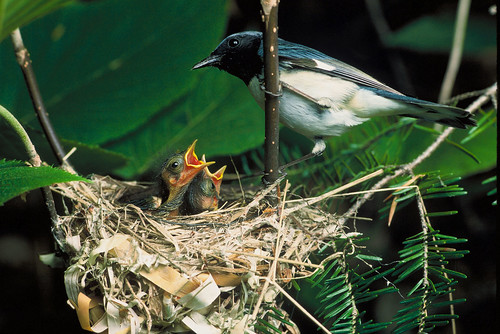tags: researchblogging.org, Black-throated Blue Warbler, Dendroica caerulescens, social information, habitat selection, vegetation structure, location cues, dispersal, Matthew G Betts
Male Black-throated Blue Warbler, Dendroica caerulescens, with nestlings.
Image: S. Maslowski, USFWS [larger view].
Wild songbirds must be able to quickly discriminate between different habitats so they can choose and establish a suitable breeding territory. Since even older, experienced breeding songbirds lose roughly 50% of their chicks to predators, even a small mistake in choosing a breeding territory can have a huge impact upon an individual's reproductive success. How do inexperienced birds choose a breeding territory? Do they rely solely on their own observations, or might their elders' successes override their common sense when choosing breeding territories?
According to a study by a research team led by Matthew Betts, a landscape ecologist at Oregon State University in Corvallis, it appears that young birds rely on songs produced by older male birds to memorize the locations of quality habitats.
To understand how young songbirds choose their nesting sites, Betts and his colleagues studied black-throated blue warblers, Dendroica caerulescens. This well-known species has fairly specialized habitat preferences and further, because the habitat remains nearly identical from year to year and because these birds tend to live in close proximity to each other when nesting, Betts and his team hypothesized that the birds might use social signals to help choose their breeding territories. Adult male warblers with chicks remain on their territories and sing longer than those whose chicks died, thereby teaching their songs to their offspring. But song is a very obvious social signal that nearby birds can benefit from, too. So Betts and his colleagues wondered whether these males' songs might act as honest, albeit unintentional, social signals indicating which territories were quality enough for successful reproduction.
Betts and his colleagues tested their hypthesis by recording the songs of adult males who remained on good territories, singing to their offspring [black-throated blue warbler song]. They went to 18 locations where the habitat was of poor quality (it was clear-cut) and played the songs. Young male black-throated blue warblers who were flying nearby and overhead heard these songs and apparently memorized the locations where they came from.
The following springtime, these birds returned to the East Coast from their winter home on Jamaica and 83 percent of the first-time breeders chose to nest on the precise areas where they had heard the songs of successful adult males the year before when they were impressionable youngsters. Worse, 27 percent of these highly-impressionable males managed to attract females to their poor breeding territories, too.
Relying on social information such as song allows birds to gather accurate information from their congeners about a large sampling of breeding habitats without having to waste a breeding season by learning for themselves whether a particular site is suitable. Social cues are especially valuable to birds that do not live long in the wild and who nest in areas that do not change significantly from one season to the next. Not only does this research increase our knowledge of the powerfule ffects that behavior has upon evolution, but it also has important implications for captive breeding programs, especially for birds that live in areas that do not change much, such as rainforests.
Source
Betts, M.G., Hadley, A.S., Rodenhouse, N., Nocera, J.J. (2008). Social information trumps vegetation structure in breeding-site selection by a migrant songbird. Proceedings of the Royal Society B: Biological Sciences, -1(-1), -1--1. DOI: 10.1098/rspb.2008.0217


Oh, no comments! I though this was in the really cool category. And The Beast wanted to know where we could get some recordings of bird lullabies.
yes, i am disappointed with the lack of comments, too. maybe i should have said something truly stupid so i could get lots of attention?
on the other hand, maybe not.
I was just a bit behind in my tagged articles. I marked this one for interest when it flew by in my newsreader, and am just now coming back to it.
This is a very cool experiment and result. I doesn't surprise me as birds are clearly smarter than we give them credit for. In the book "The Singing Life of Birds", the author explores a number of social queues in birdsong. Its a great book if you haven't read it.